-
THE CLOUD IN HER ROOM 她房间里的云 (Zheng Lu Zinyuan 2020)
ZHENG LU XINYUAN: THE CLOUD IN HER ROOM 她房间里的云 (2020)
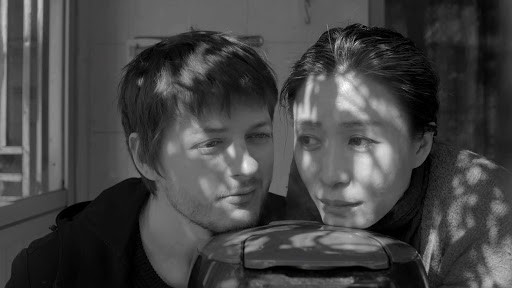
MATTIAS DELVAUX, LIU DAN IN THE CLOUD IN HER ROOM
Young Chinese woman director enters her own personal Nouvelle Vague
Zheng Lu Zinyuan, who studied film at USC, has done something a bit different for her feature debut. She has not made a bildingsroman, nor a portrait of a Chinese generation in transition like the early films of Jia Zhang-ke. This is a cinematic study in hanging out. It's vaguely autobiographical - the main character, Muzi (Jin Jing), is of the director's sex, age and generation. But if you focus too much on what's happening in the picture, you're missing the point. The delight of this loosely-slung-together piece of casually experimental filmmaking- and it does have such delight to offer if you don't push it too hard - is in its casualness, a diaristic flavor so loose even the specificity of a diary entry is asking a bit much. It's just the celebration of being there, letting the camera follow things around.
Ture, this is in its meandering way a vaguely autobiographical portrait of Muzi as she returns to her waterway-rich, typically torn-apart 9-million population mainland Chinese hometown of Hangzhou (also Zheng's city of origin). She is ostensibly on hand there for New Year's celebrations, personal reunions with family members, and her twenty-second birthday. But mainly she's hanging out. She has two possible boyfriends. There's the young laidback painter and photographer about her age, Yu Fei (Chen Zhou), and the older new guy she meets, , Dong Kang-ming, a drummer who runs a bar. Dong may be more interesting to the young Muzi. But is he more interested? But how interested is Yu Fei? These are questions casually explored off and on in the film.
There's also an old apartment her parents used to occupy that's vacant now, still rented by her father. She goes there with Yu Fei, who has come to Hangzhou by surprise to see Muzi and, in a bedroom, they have sex. At that point, they're clearly both interested.
But what's "happening" is beside the point. This is more the opportunity to meander around the town, try to find something familiar, to cast an eye around. For us and for Zheng Lu Zinyuan, it's also an opportunity to admire the soft black and white of her talented young Belgian cinematographer, Matthias Delvaux (a China resident and dp of Zhou Ziyang's Old Beast, who also briefly plays the new boyfriend of Min (Liu Dan), Muzi's mother. Delvaux lightens everything a bit, and, more radically, a couple of times gives us the negative so everything goes exotic and dark. Mostly Delvaux here makes things look like seventies fashion photography, mitigating the harshness of modern China and further encapsulate Muzi in her own personal world - except for one thing: even during an intense sex scene, we hear the clangor of the city outside.
Muzi says every time she comes back to Hangzhou it seems stranger to her, and her personal world is fragmented. Her musician father, Feng (Ye Hongming) has remarried and is the father of a young daughter, and her mother seems to get drunk a lot and have various boyfriends. All are big smokers. Smoking and drinking have always been screen staples; this is a reminder of that. And of how much this feels, at moments, like a French film. Sadly, without Paris. But there's something new here.
And yet the chief appeal of Zheng Lu Zinyuan's filmmaking may be its unformed quality, or its ability to capture that quality in its protagonist - the sense that while Muzi is moving around the fragments of her family and the great, transforming city independently, she is yet uncertain, a quality suggested by her clunky shoes. Clearly the director has some clunky shoes too, but not as clunky; and her boldness and freedom bode well.
TRAILER
The Cloud in Her Room 她房间里的云 (Ta fang jian li de yun), 101 mins., debuted at Rotterdam, where it won the top prize, the Tiger Award. It is included in 6-10 other international festivals with other nomnations and awards, including Taipei, Hamburg, Hong Kong, Singapore, and Dec. 13, 2020 in the postponed Dec. virtual pandemic edition New Directors/New Films series, as part of which it was screened for this review.
Last edited by Chris Knipp; 12-17-2020 at 04:06 PM.
-
THE TROUBLE WITH BEING BORN (Sonndra Wollner 2020)
SONDRA WOLLNER: THE TROUBLE WITH BEING BORN (2020)
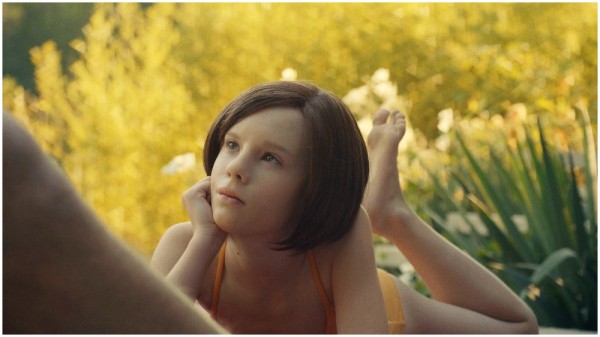
An unspeakably creepy and precise film about desire and the future from Austria
Austria is where such things often come from. We follow an android constructed by a father of his young daughter and then used in vaguely unspeakable ways. A ten-year-old actress is used. She wanders off (semi-human, perhaps, as in Spielberg's A.I.) and is taken up by an old crone who misses the younger brother she lost many years ago. Somehow the android is repurposed easily as a male.
Some lines of thought really don't bear being worked out or, when they are, being watched as movies. But you may want to watch this, because it is undoubtedly impeccable in its construction. In her Variety review Jessica Kiang calls it "rivetingly unsavory," a "a desperately creepy, queasy, thought-provoking film", and ends, "Wollner's lacerating intelligence and riveting craft make this extraordinarily effed-up riff on the 'Pinocchio' legend [and] . . . much more than empty provocation."
The Trouble with Being Born, 94 mins., debuted at the Berlinale Feb. 2020, and won the special jury award there in the Encounters section. It played at about a dozen other international festivals, including the postponed Dec. virtual pandemic edition of the 2020 New Directors/New Films, where it was screened for this brief notice Dec. 15, 2020.
Last edited by Chris Knipp; 12-17-2020 at 03:54 PM.
-
KALA AZAR (Janis Rafa 2010)
JANIS RAFA: KALA AZAR (2020)

PINELOPI TSILIKA, DIMITRIS LALOS IN KALA AZAR
Perhaps pre-apocalyptic world or spreading disease and roadkill, seen through a young couple making do
This film, by an art video maker, chronicles a Greek couple who work as professional pet cremators. or their delivery people, for a municipality. They go around gathering defunct pets, take their remains to be cremated, then return the ashes with a certificate to the owners for preservation. It's all done legally, or is supposed to. Sometimes they may break the rules. They are not allowed to retrieve roadkill but they do. Since the couple rarely say anything, we may not know a lot about them. Something about a father's dog's accident and severe facial injury. Formulas rehearsed and recited to pet owners. They have sex in their car. No conversation during or after that rough and tumble. Minor sub-themes: soothing the body with balms made from cactus juices and, yes, dogs. One man filmmaker Janis Rafa, or his cameraman Thodoros Minopouloss, has a fresh angle on point of view, and a gift for stillness and neutrality.
The couple, whose lives are not much explored, seem to like animals - perhaps trained as vets but out of work? Kala-azar is the name of a parasitic disease spread to humans by bits of sand flies; according to the Screen Daily review of this film, it is "wiping out swathes of the canine population of southern Europe," which would explain its inclusion here.
The couple is just working for the crematorium, but as a couple. Not a very good job really, so it's not a big surprise when they start not getting along so well. They should be considered between jobs - perhaps between relationships. I considered myself between films when I watched this. And while this is filmmaker (Janis Rafa's first feature, I'd see it as a possible stepping-stone to something more substantial and important, a glimpse of a willingness to take chances, but not quite there yet (New Directors/New Films discoveries are often like that).
Leonardo Goi, who reviewed the film for The Film Stage, extrapolates a bourgeoning worldview from this subject matter, seeing it as depicting a "disquieting, moribund universe" and a "wasteland of industrial debris and derelict houses frozen in a 1990s impasse" and notes that pets' level of "grieving" they may "aspire to" (as if pets aspired to grieving) depends on the level of their owners. All this may be reading too much into it. Probably Wendy Ide, who reviewed the film for Screen Daily, is closer to the mark in arguing that this isn't a film that "anthropomorphizes the beasts" and in fact is more intent on "finding the animal at the heart of the human characters." That's what the wordlessness and lack of background is probably consciously or unconsciously doing. But that may be doing too much. Penelopi and Dimitris may be somewhat marginal, but not that marginal.
Just for fun, at the end, a uniformed military drums and brass band plays in a large henhouse, and the hens really like it. Then they're packed off in crates, just the same.
This won top prize at Rotterdam, Europe's festival headquarters for edgy weirdness.
Kala azar, 75 mins., debuted at Rotterdam, where it won the KNF Award and was a nominee for the Tiger Award, which The Cloud in My Room won, showing also at Zerkalo Tarkovsky festival (internet version), Galway (internet), Thessaloniki, and in New Directors/New Films Dec. 2020virtual pandemic version, as part of which it was screened for this review.
Last edited by Chris Knipp; 12-16-2020 at 08:19 PM.
-
NEFI'S FATHER (Mamadou Dia 2019)
MAMADOU DIA: NEFI'S FATHER
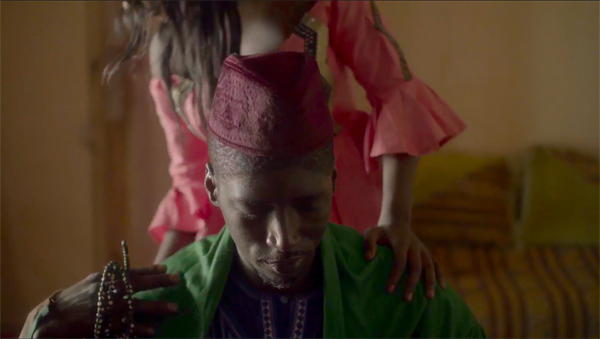
ALASSANE SY IN NEFI'S FATHER
A family conflict with political resonance
From Senegal and set in a town among leading families, Mamadou Dia's NEfi's Father is a tale of almost Shakespearean complexity and moment. It centers around Tierno (Alassane Sy), the principle imam of the town. He becomes angry when he learns that his daughter Nafi (Aďcha Talla), without consulting with him, has agreed to marry the son of his older brother Ousmane (Saďkou Lo). Tierno determines to stop this event from taking place however he can, but without destroying Nefi's independence or her plans of going to university.
The two brothers represent opposite orientations toward the world. Tierno is local and democratic. He favors independence and moral behavior. Ousmane is linked up with Islamic fundamentalists who Tierno knows are part of a violent international terrorist movement. Ousmane is growing stronger locally and as his strength grows, his ideas become more extreme. Meanwhile, though Tierno is intensely determined, his hard-headed will doesn't work well in convincing his opponents, and he may not realize how much the conflict has a basis in personalities, rather than principles.
Nefi's Father is a strong example of filmmaking that uses authentic local settings and people all the way. The look and feel of the scenes is wonderfully African, with a simple beauty and directness that pleases the eye. As the Variety review notes, the visuals are "marked by handsome compositions and a sensitivity to color and shadow," rooted in "location and character" and never an "exoticized locale" that is "designed for foreigners." The languages are local with a mixture of French words. The dignity and confidence of the actors never falter. The theme is both timely and universal. However, I found the machinations of the plot difficult to follow and over elaborate ("the script could use tightening" - Variety), and some of the line readings tend to falter and the dialogue stutters and loses its forward rhythm from time to time as well.
Nefi's Father/ , 107 mins., debuted at Locarno (winning the Golden Leopard and best first feature awards there; three other awards and more nominations) , and showed in the festivals at Rotterdam, Göteborg, Atlanta, and Raindance. Included in the virtual pandemic delayed Dec. edition of the 2020 New Directors/New Films series, in which it was screened for this review.
Last edited by Chris Knipp; 12-19-2020 at 01:31 AM.
-
NASIR (Arun Karthick 2020)
ARUN KARTHICK: NASIR (2020)
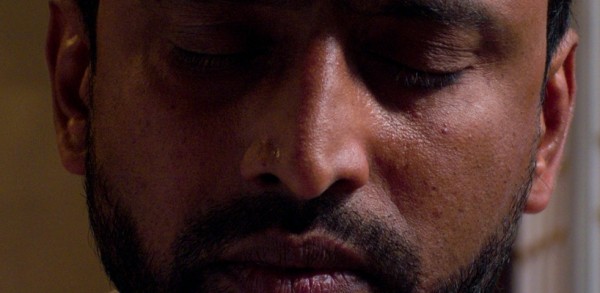
Death of a sari salesman
This little film is a poetic, observational gem with a shock finale. Young Indian director Arun Karthick's short feature was shot in Coimbatore or Kovai, a city in the Indian state of Tamil Nadu on the banks of the Noyyal River and surrounded by the Western Ghats. Based on Dilip Kumar's diaristic 2012 short story, "A Clerk's Tale," it freely incorporates details that give it a semi-documentary realism at times.
It also implicitly refers to Coimbatore's September 2016 anti-Muslim riots, evidence of recent sectarian violence in the country including fatal lynchings. It's clear throughout that Nasir, the protagonist, is part of a 10% Muslim minority in a Hundu town and there is prejudice. We awaken in a Muslim neighborhood to the sound of a superb, probably recorded, call to prayer. But things are peaceful up to near the end, where a journalistic, poetic voiceover (for Nasir is an accomplished, unsung poet) is abruptly interrupted by the onrush of a rioting angry racist crowd pouring through the narrow streets.
Karthick frames his film in 4:3 TV ratio for intimacy and perhaps a sense of crowding, and the corners are curved. Nasir lives with his wife (Sudha Ragunathan) and mentally handicapped nephew Iqbal ("Sabari") in a cramped apartment in a crowded ghetto of the city. Everything about this film is intimate, sometimes intimiste; it's almost like a highly colored miniature: the first shots are up close on Nasir's face, showing only parts of his body or the room as he gets up, shaves, showers, dresses, and so on. There's a sense that this may be minute-by-minute through the day.
Of course it is not that. Nasir sees off his wife on a trip to help relatives with a wedding for a few days. He refers to her throughout the day, addressing letters and poems to her (and reciting a poem also to his coworkers at the sari shop where he works). The action is decentralized, collective. There are so many saris in rows and rows of colors and so many other employees, it's hard to keep track.
What stands out in this film is its sense of the colorful quotidian of life in India in the poorest shopkeeper class. Let's not forget that we don't know how they relieve themselves, that there is no running water, but water gathered in contemporary plastic replicas of the old jars carried to and from wells. A meeting with someone gives a glimpse that Nasir might be able to get a temporary job in f Abu Dhabi, and could be in a Muslim environment and make money.
The sari shop is Hindu-owned, and even the mannequins have bindi dots on their foreheads. But everyone seems friendly, as noted in the respect for Nasir's ability as a poet. At day's end Nasir is sent on an errant, which he may never conclude.
The film excels in its sense of specificity, and in service of that, a strong narrative line is allowed to slide a bit. The point is to observe a string of little ordinary harmless detials that unreel with no awareness that they may be one's last. The recreation of a world is remarkable, highlighted by the skillful wrangling of non-actors and negotiating of cramped and crowded spaces heightened by the compact aspect ratio and the intimate cinematography.
Nasir, 95 mins., debuted at Rotterdam, continuing in the We Are One (pandemic YouTube) festival, Internet Mirror Andrey Tarkovsky International Film Festival and several other virtual festivals including the Dec. New Directors/New films, within which it was screened for this review.
Last edited by Chris Knipp; 12-16-2020 at 10:32 PM.
-
FEVER, THE (Maya Da-Rin 2019)
MAYA DA-RIN: THE FEVER (2019)
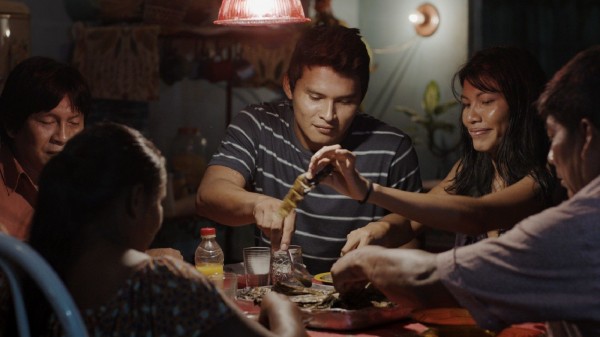
Tristes tropiques
The focus of this low keyed film about Amazonian indigenous people is Justino (Regis Myrupu), an impassive Desana man who has long lived and worked in Manaus, the Brazilian port city often in the news for Amazonian forest fires and gang violence. He works as an industrial site security guard - like a hunter with nothing to hunt, he says, showing he still has the old mindsets. He lives with his grown daughter Vanessa (Rosa Peixoto), who works in a hospital but has received a scholarship to medical school in Brasilia and will go there on her own for six years, leaving Justino alone. Whether it's this prospect causing the mysterious fever that now infects Justino or a deeper malaise of jungle longing years in the making we don't know. Nor does he, but he has strange dreams and, like Freud, he believes in them.
There are also hints sent out from the news that some mysterious beast is on the prowl; Justino sees it stirring when he returns from work one evening. and later it chews through the industrial wire fence. Justino and Vanessa discuss it with his older brother, who lives back in the territories but comes to visit and urges Justino to visit him, to breathe. But Justino is under the thumb of his controlling industrial employer, who apparently won't even let him have a few days of sick leave. His only visible coworker is a white man in the locker room who drops racist anti-Indian hints.
Justino seems a man bereft of good cheer. Myrupu's performance, impressive enough to get him a festival acting award, is an example of the ineloquent in art. His impassiveness suggests a strained stoicism. The isolation of indigenous people, the underlying theme, has been bluntly hinted in the film early on by the appearance of a woman who turns up in Vanessa's hospital, speaking an indigenous language nobody knows and knowing no other.
In his brief Now Toronto review of this film Kevin Ritchie notes its emphasis on repetition, "the banality of industry" (actually somewhat aestheticized), the "intense sound design and darkness/shadow" (noises, whether of machinery or dogs, always turned up), and the messages delivered of "cultural and environmental erosion" pointedly delivered. Ritchie points out that since "the conceit all hinges on Justino’s stoicism" he tends to "seem like a blank canvas for the filmmaker" - one that most of the time simply remains blank. ("Bressonian" perhaps, since Bresson called his actors "models.")
For a while, The Fever builds suspense. What is this fever, we would like to know. But when no answer is forthcoming, the action turns anticlimactic and blank. "Primarily a mood piece," as Ritchie says. The suspense turns out to have been a red herring. A subtler actor and a richer script could have delivered more on this important theme.
The Fever/A Febre, 98 mins., debuted at Locarno, where Regis Myrupu won the best actor award; in at least a dozen other festivals, including the delayed Dec. 2020 pandemic virtual New Directors/New Films, as part of which it was screened for this review.
Last edited by Chris Knipp; 12-19-2020 at 11:21 AM.
-
LOS CONDUCTOS (Camilo Restrepo 2020)
CAMILO RESTREPO: LOS CONDUCTOS (2020)
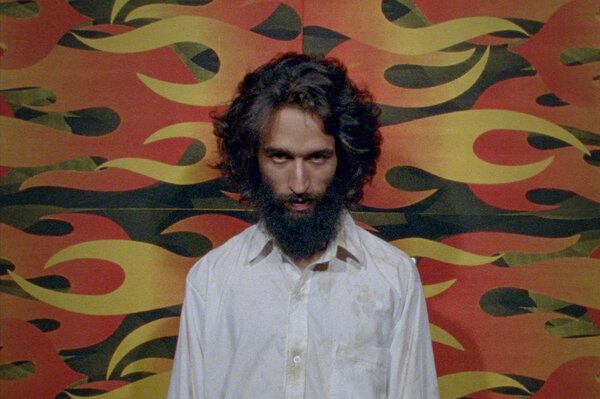
LUIS FELIPE LOZANO IN LOS CONDUCTOS
TRAILER
Led by a fugitive
"A challenge to decipher," wrote Deborah Young in Hollywood Reporter after seeing Camilo Restrepo's Los conductos in Berlin this year. (It won the best first feature award there; it also won prizes at Mar del Plata and San Sebastián.) John Hopewell of Variety says it appeals "to a variety of visual styles [sic]," and "can be read as a portrait of the difficulties of reinsertion in a post civil conflict Colombia, or the enduring devastation of any kind of fanaticism, even when an individual has renounced its creed." More specifically, Carlos Aguilar explains in The Film Stage the basic thing: that the movie's based, but not literally or linearly, on the actual experiences of the main actor, Luis Felipe Lozano, who was involved in a cult with a young leader known as "Father" that committed crimes and induced its members to participate in them, and he escaped from it to reenter society. Restrepo himself finishes in an interview with Michael O'Keefe by adding that, on doing so, he realizes he is not going to be able to reenter society exactly, but will have to live on its margins in the corners of the Colombian city of Medellín (whose expansive cityscape is admired). We follow him, listening to his eloquent voiceover commentaries in deliciously swishy, sibilant Spanish, as he hides out in a succession of empty warehouses and makes his way through various encounters.
Los conductos is indeed hard to parse but it nonetheless satisfies for its splendidly cinematic qualities. Restrepo chose to shoot on 16mm film, for many reasons, he says, and he finds a new reason every time he is asked why. One of them is that film makes filmmaking more existential. You haven't dozens of chances to get it right. Another is that he is also a painter, with an affinity for American color field abstraction, and 16mm film's layers of color he finds satisfyingly painterly. The point is, Los Conductos is intensely visual. The protagonist, Pinky (Luis Felipe Lozano) spends a period working in a T shirt factory (a documentary passage, for Lozano-Pinky really did work at such a place) and then a small factory where film fabric is hand printed with large screens - with what appear to be graphically simplified flames of hell. From the opening titles one senses that this is a film with its own personal sense of visual design.
As Pinky, Luis Felipe Lozano is in some sense playing himself. He is a small, wiry, muscular man with bushy flowing hair and beard, Christlike in appearance and with a dare-devil madness and calm about him. He is one of the film's highest concepts.
The action begins with an electrifyingly scary motorcycle ride, with Pinky the rider: it's an amphetamine rush of energy. Los Consuctos also regularly shifts to other styles. There is a semi music video scene, showing Pinky on drugs; a comic sketch of an underground show with Pinky and one of Father's sons; expansive visual passages of devastated landscape; and a meeting with the re-embodiment of "El Desquite," the fifties Colombian criminal, bandit, sex offender and selective killer (as Spanish Wikipiedia describes him). There are parables, like that of the Lame Devil.
All this best conforms to Restrepo's sense that depictions of Latin American social and political dysfunction should unfold an "audiovisual collage," never being too specific, lest their respective countries be tied to the literal details of them forever. (I admit that I was expecting a flick about a gangster on the lam, and when I saw it wan'st going to be that, or anything very clearly definable, I was at first disappointed. But I got with the program after a while, and went with the flow. It sweeps you up.)
Los conductos is also another recent first feature shot effectively in dramatically boxy aspect ratio ( 1:33). This time the format very much helps make everything feel more hallucinatory, intense, and hyper-focused, with the surrounding scene mysterious. Restrepo avowedly doesn't work from a script or "in a narrow, linear way." Obviously he is comfortable doing that, and it's a method that allows him to throw out multiple meanings as well as change gears rapidly without losing momentum.
This is also another new independent film with great sound, which helps convey a hallucinatory intensity and sense of the outside world impinging upon Pinky as he escapes back into it, with uneven success.
Restrepo is a filmmaker whose promise was clear from three vigorous recent shorts, La impresión de una guerra (2015), a series of images of the country's state of continual conflict; Cilaos (2016), about a woman in search of her father; and La bouche (2017), about a man oscillating between appeasement and vengeance over the murder of his daughter. Vengeance is a theme of Los conductos too.
Los conductos ("The Conduits"), 70 mins. debuted at the Berlinale, where it won the best first feature award and was nominated for the Encounters award. It has played in at least 8 other festivals including San Sebastián, Mar del Plata, and theDec. 2020 delayed virtual pandemic edition of New Directors/New Films, as part of which it was screened for this review. .
Last edited by Chris Knipp; 05-10-2021 at 09:43 AM.
 Posting Permissions
Posting Permissions
- You may not post new threads
- You may not post replies
- You may not post attachments
- You may not edit your posts
-
Forum Rules





 Reply With Quote
Reply With Quote






Bookmarks